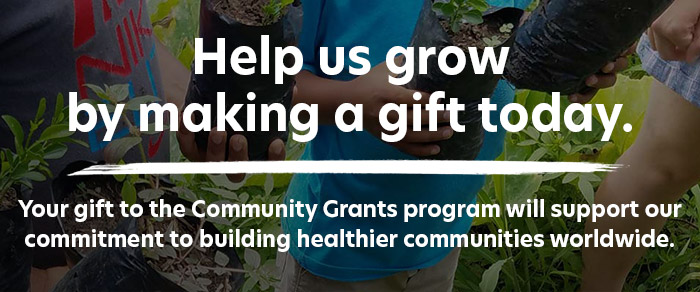

This article contains material regarding eating disorders that may be triggering for some readers.
According to the American Psychiatric Association, eating disorders are illnesses in which people experience severe disturbances in their eating behaviors and related thoughts and emotions. People with eating disorders typically become preoccupied with food and with their body weight. An eating disorder takes over one’s thoughts, body, and life; I speak from experience.
I will begin with letting you know that recovery is possible. As someone who has recovered from anorexia and bulimia, there is hope for recovery. I want to share this hope with you.
Years of my life I spent in the vicious cycle of an eating disorder. My unhealthy relationship with food began when I was 12 years old, and it would eventually spiral into anorexia. I would look in the mirror and have no idea where I had disappeared to or who I had become. I was never present. I didn’t laugh or connect with anyone because I was living as a complete prisoner to the eating disorder and to the intrusive thoughts. I was terrified. I was in a constant state of cold, both physically and mentally, and at the core of everything, in terrible pain.

In my late twenties, my battle with anorexia reached its most dangerous point. Years of this battle had now led to many visits to the emergency room and serious illnesses, such as pancreatitis, kidney stones, and countless digestive issues. I was in such a frail condition and struggling to even get out of bed.
I knew I had to make changes, yet I had no idea where to begin. The one thing I did recognize was that, fundamentally, my relationship with food had to change in order for me to begin the recovery process.
With the encouragement of my now husband, doctor supervision, and dietician support, I began focusing on whole, plant-based foods. This transition truly changed the way I thought of food.
According to The National Eating Disorders Association (NEDA), there are five stages of recovery; precontemplation, contemplation, preparation, action, and maintenance. For me, precontemplation was my adolescence and young adulthood. I spent years as a vegetarian for ethical reasons, not knowing the facts or being able to really identify that dairy had great potential to work against my overall health I also did not know the devastating environmental impacts of the dairy industry during that time. As I began to read more on my own and make these connections, I entered the contemplation stage of recovery, with the newfound encouragement of what a plant-based diet would offer me.
I knew I wanted to make a change. I knew I had to heal my relationship with food. I also knew that the eating disorder had caused me to become isolated, and that I needed the support of others to really begin the recovery process. I spent a lot of time finding a plant-based dietician, as well as a therapist to support me. I also joined a virtual support group. This was my preparation stage of recovery.
I was feeling more encouraged and hopeful than I had in years. The work did not stop at my decision though, as I had to be very dedicated to attending dietitian appointments, therapy sessions, and my support group. It was time for the action phase. I had to do the work. I attended all sessions, journaled, removed triggers from my environment, and overall, finally had the confidence to do so. As I began to recover, the energy and renewed health that I found was incredible, and I wanted more than anything to just keep going! That is exactly what I did.
So, one foot in front of the other, I began the journey of healing. With the encouragement of my now husband, doctor supervision, and dietician support, I began focusing on whole, plant-based foods. It was not an overnight process, of course, but once I was committed to a fully plant-based diet, I saw recoveries each and every day. This transition truly changed the way I thought of food. I had not eaten meat for many years already, but my new dedication would be omitting all dairy as well and replacing it with healthier alternatives. It felt more in tune with my ethical beliefs to no longer consume dairy. This change also led to major improvements in my stomach pain, energy, and anxiety. I gradually started being able to digest raw vegetables and eat salads again. My thinking and anxiety had improved so much already with this change to a fully plant-based diet, which had been the missing piece for me for years.
I also lessened my consumption of processed foods and began to eat many more whole plant-based foods. I felt like I had freedom to actually eat more, as my choices seemed bountiful and healthy. My thinking transitioned to how I was nurturing and caring for my body through a whole food, plant-based diet. It was and continues to be empowering and invigorating!
After years of battling infertility and being told I could not have children, I am so happy to share that I had a very healthy plant-based pregnancy. We now have a beautiful baby boy! A healthy and balanced plant-based diet restored my self, my health, and my life. My plant-based journey continues to provide health benefits I never thought were possible.

Presently, I feel better than ever, and my family and I maintain a fully plant-based lifestyle. I am forever grateful for those that supported me on this journey, and for those that continue to share the knowledge of the healing power a whole food, plant-based diet offers.
I hope this story inspires and empowers you or someone you know that struggles with an eating disorder. Please remember that you are not alone in your journey to recovery. Having a strong support system in place was so essential for my progress. Do not hesitate to reach out to a professional, friends or family to seek help. It is never too late to begin your life.
All diets, including a whole food, plant-based one, require diversity in what you eat and an assurance that you are meeting your body’s needs for adequate levels of essential vitamins and minerals, protein, fiber, and the works. However, it is also important to remember Dr. T. Colin’s Campbell’s principles of wholism. Reductionist views tend to paint food as only as the nutrients it serves us, and while our health will directly reflect what we feed our bodies, we must remember the importance in taking care of ourselves as a whole including our mental health and the emotional relationship we have to food.
References
- What Are Eating Disorders?, American Psychiatric Association , www.psychiatry.org/patients-families/eating-disorders/what-are-eating-disorders.
- “Stages of Recovery.” National Eating Disorders Association, The National Eating Disorders Association (NEDA), 22 Feb. 2018, www.nationaleatingdisorders.org/stages-recovery.
Copyright 2026 Center for Nutrition Studies. All rights reserved.
Deepen Your Knowledge With Our
Plant-Based Nutrition
Certificate
Plant-Based Nutrition Certificate
- 23,000+ students
- 100% online, learn at your own pace
- No prerequisites
- Continuing education credits





